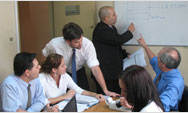 |
|
 |
 |
 |
- 10/21/08: Remarks by Henrietta Fore, Administrator, USAID and Director of U.S. Foreign Assistance at the White House Development Summit
- 10/08/08: Remarks by Henrietta Fore, USAID Administrator and Director of U.S. Foreign Assistance at The President's Freedom Agenda
- 10/01/08: Remarks by Henrietta H. Fore, Administrator, USAID and Director of U.S. Foreign Assistance, at the Ceremony Marking the Full Operational Capacity of Africa Command (AFRICOM)
- 09/25/08: Remarks by Henrietta H. Fore, Administrator, USAID and Director of U.S. Foreign Assistance, at 2008 Millennium Development Goal Malaria Summit, New York - "U.S. Leadership in the Fight Against Malaria"
- 09/22/08: Remarks by Henrietta H. Fore, Administrator, USAID and Director of U.S. Foreign Assistance, at the White House Symposium on Advancing Global Literacy - "U.S. Commitment to Advancing Global Literacy"
 RSS Feed for Recent USAID Speeches and Testimony RSS Feed for Recent USAID Speeches and Testimony
|
|
 |
 |
 |
|
USAID Conflict Management Activities in Africa
USAID Conflict Management Resources
Related USAID Topics
|
|
 |
 |
|
 |
 |
|
Remarks by Henrietta H. Fore
Director of U.S. Foreign Assistance and Administrator, USAID
Ceremony Marking the Full Operational Capacity of Africa Command (AFRICOM)
Pentagon Conference Center, Department of Defense
October 1, 2008
Secretary Gates, Admiral Mullen, General Ward, secretaries, members of the diplomatic corps, members of the military services, and colleagues from the foreign assistance community, and Congressman Meeks - particularly good to see you: I am delighted to be here with you today and to represent the United States Agency for International Development (USAID) and the Department of State on this historic occasion.
On behalf of all of my colleagues, I wish to congratulate AFRICOM on reaching Unified Command status. We look forward to working closely with you as you carry out your new and vital mission.
Secretary Gates has spoken powerfully and eloquently on many occasions about the need for the United States to enhance its non-military as well as military instruments of national power in service of our foreign policy objectives. The Department of State and USAID are proud to play their respective primary roles in diplomacy and development.
All three agencies can take pride in our collective track record and accomplishments in delivering humanitarian assistance, advancing peace and security, promoting the rule of law and good governance, investing in the well-being of Africa's people in times of crisis and in times of peace, and spurring economic growth on the continent.
The Department of Defense, through AFRICOM, focuses on supporting military professionalization and military capacity building to enhance the ability of our African partner nations to manage their own security, thereby enhancing their development prospects. In fact, we welcome AFRICOM's innovative and integrated commend structure.
The State Department will ensure that AFRICOM's activities are coordinated by our Ambassadors. Such coordination will make certain that foreign policy priorities are met, complementarity between all USG programs and activities is maintained, and overall effectiveness is maximized.
This is the embodiment of the 3 D's - diplomacy, development and defense - in the national security strategy.
Just as Secretary Gates sees development as crucial to the success of the overall mission of the Defense Department, USAID and State, in turn, recognize how fundamental security is to the success of our respective missions. The link between security and development is clear throughout sub-Saharan Africa. With improved security, Liberia and Rwanda, for example, are beginning to experience sound economic growth, better living conditions, and improved governance following years of devastating armed conflict.
To strengthen coordination with AFRICOM and ensure that DoD activities in Africa support U.S. foreign policy priorities, Ambassador Mary Yates, one of the State Department's most distinguished Africanists, and two additional senior-level Foreign Service Officers have contributed their considerable expertise to AFRICOM.
USAID is strengthening its coordination with the Defense Department, through our Office of Military Affairs, established in 2005. Military liaison officers from each of the geographic Combatant Commands and the Special Operations Command are assigned to USAID and likewise, USAID Senior Development Officers are assigned to the Pentagon and to the geographic commands. To AFRICOM, we are assigning five officers, including two of our most senior, Mr. Ray Kirkland and Mr. Carl Rahmaan.
This marks a real change from the way things were just a few short years ago-and signals a clear change within our organizational culture.
Our people are working side by side. Let me give you two examples of how this evolving partnership can work. In a time of national disaster, AFRICOM will be relied upon to provide logistical support. Working with African governments and our NGO partners, in towns and villages, we identify the needs of vulnerable populations for humanitarian assistance. We call upon our military to provide lift capacity and support to reach the people. We in USAID are the hub, coordinating with our NGOs, the host country government and the military. This proved to be an effective model during the flooding in Kenya in 2007, and Mozambique in 2000.
As another example, we are all concerned and preparing for responses that would be needed in the event of a pandemic of avian influenza. AFRICOM and the U.S military's Pacific Command (PACOM) will focus on linking military-to-military initiatives, recognizing the important role that national militaries are likely to play.
We strongly support AFRICOM's mission focus on military-to-military security cooperation, an area of engagement the State Department and USAID believe will maximize the Command's added value to U.S. Government combined efforts in Africa.
We expect AFRICOM to substantially contribute to African defense sector reform and to build African partner capacities in peacekeeping, coastal and border security, and counterterrorism.
We look forward to this evolving relationship, the central point of which must be clear---that security, stability and peace are essential for the quality of human life…and essential for development. We know well that the conditions for economic growth and poverty reduction are a secure, stable, and appropriately governed environment.
Paul Collier of Oxford University has famously estimated that the cost of a single war in a low-income country is around $64 billion. Multiplying this across the 21 countries in Africa that have experienced armed conflict over the past 25 years gives you an idea of how absolutely devastating conflict is to national, regional and local economies. Although an average conflict lasts seven years, it will take a country a full seventeen years to return to its pre-conflict GDP growth rates. Conflict is an impediment to development and to families and nations building their future.
During my travels as Director of US Foreign Assistance and USAID Administrator, I have seen firsthand the terrible toll that conflict takes on peoples' lives. In Gulu in Northern Uganda, all livelihoods in agriculture and small commerce had ceased, as farmers and business people left out of fear. In Goma, DCR, women and children bear the greatest burden. You see the hospitals filled with women who have been raped, and children maimed. In Darfur, we are feeding three million people a day, people who are displaced by conflict. In Liberia, , there are still many adults who are not literate, as the schools closed with the conflict. But, with peace, it is a time of hope…..
To our African friends and partners in the audience, I want to reiterate the U.S. Government's commitment to supporting your plans for your countries. We have long and fruitful ties with your nations, and I am here today in part to reiterate that commitment to you, as well as give the support of the American people to your continued progress.
Again, you have not only my best wishes today, General Ward, as you take command, but my commitment to strengthening the relationship between AFRICOM, the State Department, and USAID in the future.
Thank you
Back to Top ^
|


